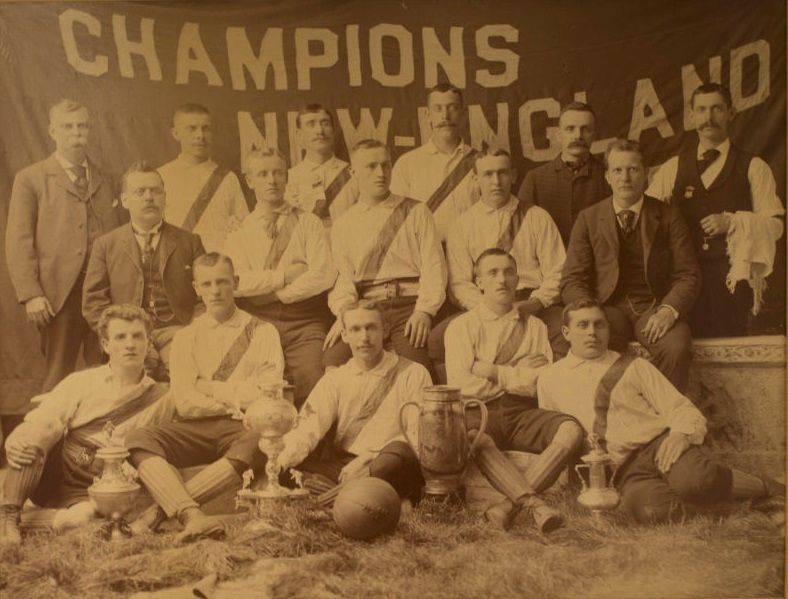
Jimmy Johnston

In 1893 the winner of that year's American Cup came from the Rhode Island mill-town of Pawtucket. It had two major teams, the amateur YMCA that would enter the Cup for the first time the following year, and the at least shamateur and probably semi-professional Free Wanderers. Moreover, both teams would share one characteristic. They were based on Scots. YMCA would have Moore, Holbourn, Cochrane, Leggett and Cameron within its ranks plus the footballing philosopher, Alex Meiklejohn, born in Rotherham en route to the United States but the youngest son from a family otherwise all born North of the Border. Wanderers would include Jack Stuart, Alex Jeffery and Jimmy Johnston and it would be the last of these who is most interest, not least because he was not only an American soccer player of note but also a former Scottish international.
James Johnston was, just to confuse matters, born in Johnstone in Renfrewshire. At twenty he, a half-back, was already turning out for Abercorn in neighbouring Paisley and in 1888 at twenty-one capped in a 5-1 defeat of Wales. He can also be seen in the eleven that was beaten by Celtic the following August but was not there to draw away with the same club in March 1889. Yet he was certainly back in the team in March, April and May 1891 and at that point it might have been expected that English clubs, which were at the time hoovering up Scottish talent, would have come in for him. But none did or at least none that, even with him working as a fairly humble Machine Tool Maker, made an offer that tempted him. Instead, at the end of the first season of the Scottish League, where his club finished comfortably mid-table, he was on the boat to America, arriving in New York at the end of the first week of June.
Once in the Big Apple he disappears from view for a year or so only in 1892 to re-emerge in Providence in Rhode Island, where he played for Metropole. There were two Muirheads in the team, Tommy beside him at centre-half, a Croan in goal, a McDonald and a Murray up front and they would lose in the American Cup First Round to Canonicuts from Fall River on a replay. That was before the following year, now twenty-six, probably moving to neighbouring Pawtucket and there certainly turning out for the Free Wanderers for three seasons, including the first at the end of which he new club had taken the same trophy, then the US soccer's highest. The photograph above shows the winning team. No names are given but they are mostly very young men with him one of the older heads, perhaps in strip, back row, right.
Jimmy seems to have retired from playing in 1895, at the age of twenty-nine. But he would remain in Pawtucket. In 1900 he is a Machinist, boarding there on North Main St. . Yet he was to return to Scotland not once but at least twice, not least because on the first occasion in 1903 from an address given as back in Johnston he married in Campbeltown an Argyll girl, Mary McGeachy. The couple, however, would not remain in Scotland. They returned to Pawtucket, there having two children, a boy and a girl, making a second trip home together in 1907, probably due to Jimmy's father's death, but otherwise living out their lives mostly in the same house in the New England town. Mary would die there in 1940. Jimmy, noted footballer on both sides of the Atlantic, quiet pioneer in the latter, would move in with his son and family close by and at the age of eighty-three die still there in 1952. And they all are buried in the local Swan Point Cemetery in a grave that perhaps deserves a little soccer-recognition.
